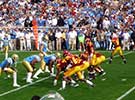
10 Reasons You Lose Money Betting
by Expert Sports Handicapper Kurt T Poway
Do you ever ask yourself why you are losing money every season? Profitable sports betting requires time, skill and smart bankroll management. I can attest there is a lot of money to be made betting on sports- I've done it successfully 8 out of 10 years and personal know more than a dozen sports professionals that have made a nice living betting on sports. The key to winning money is discipline - If you are losing money, I would bet it is because you have bad gambling habits: wagering on high profile TV games, picking emotional favorites, not doing your homework, and other bad habits like betting parlays, teasers, and live betting. Discipline in sports betting is paramount and you better get control of your bad betting habits if you want to start acting like a professional. Here is my top ten reasons why most sports bettors lose money every season:
1. You Don't Do Your Homework
Between ATS match-up stats, trend sheets, injury reports, score extrapolations, weather and team news where does a handicapper know where to begin? Did you know there are 347 Division I basketball teams? And more than 2000 NBA games each season? There are three types of sports handicappers. 1.) Stats guys usually subscribe to the likes of StatFox.com types of sites and pour over thousands of rows of data. 2.) The feel players watch 15-20 games per week and develop a 6th sense as to what the true match-up line should be and spring when they spot loose lines. The 3rd type of handicapper is a combination of the stats handicapper and the feel player. To successfully beat the book you need to either be a stats nerd or watching a hundred hours of games every month.
2. Time
Be honest, between work and your family and social life, when do you have time to research every match-up each and every day? There is a ton of daily data that needs to be combed over and how do you know if a line passes the eye test if you have never seen either team play. Watching dozens of teams through out the year requires a lot of time and energy. The only way most weekend warriors can overcome this overwhelming stats data for every team is to subscribe to a complicated ATS algorithm or partner with a professional sports handicapper - someone that does it for a living and spends +50 hours a weekend putting in the time it takes to be successful. If you don't partner with a professional handicapper than I would recommend you focus on 5-6 teams or 1-2 NCAA conference and focus on your niche as there is too much data for one person to be an expert on every team.
3. Playing Hunch Bets
So you thought Baylor -2.5 against Oklahoma was a great bet because they destroyed every other team they played this season. But did you know that Baylor had two defensive linemen out that game and a backup freshman quarterback? Just because a team catches your eye because you have memories of past performances, this doesn't always translate to what is happening in week 8 of the season, especially if you aren't aware of key injuries and playing conditions. Don't be afraid to trust your gut when making your picks but make sure all picks are statistically confirmed and screened.
4. Tracking Team Momentum
Most squares (novice gamblers) completely overlook team momentum when making their picks. Two examples of momentum teams this season: Oregon Duck and Auburn Tigers. Oregon Ducks early in the season got drummed by Utah early in the season, but hit stride middle of the seasons against Colorado winning their next 5 out of 6 convincingly. The Ducks looked like the #1 team in the country against California and is why I hammered them against Stanford the following week. Auburn is another example of a team that looked like shit their first 3 games, but once they switched quarterbacks things being to gel and the OC found schemes that were working. In college you will often see teams drastically improve from plugging in new players or getting more comfortable with the play calling. Never lose sight of a team's momentum.
5. Poor Bankroll Management
You should think about the type of investor that you are. Are you aggressive or conservative? Are you experienced or a novice? The answers to these questions will help you to determine the size of your typical bet. This is called your betting unit size. At Oddsboard.com you will see all of my picks denoted with a units range from 1 to 5, depending on which type of investor you are this can mean $100 to $500 value range or for dime players this would be $1000-$5000 per player. There is always certain match-ups and point spreads that provide higher value; look at your picks for the day and grade your picks from 1 to 5. Stay consistent with your or your handicapper's bankroll and don't stray from the game plan.
6. Your Not Using a Professional Handicapper
Unless you are a financial advisor you don't manage your own money do you? This is because you are not an expert in the financial markets and all of the nuances required to maximize the growth of your investments. Find a handicapper with a proven track record and stick with him for a season. So many guys will buy picks for 1-2 days or 1-2 weeks and complain they lost money. Remember a professional handicapper will lose 35-40% of the time, so hold true to the course and give your sports advisor 3-4 weeks before you throw in the towel.
7. Solely Following ATS Trends
When I look at ATS data, I typically look no more than 5 games back. Any further back the data loses value and isn't worth baking into the equation. There are some believers that are die-hard ATS stats guys, while I'm personally more of a feel player and watch 20-30 games per week. In my opinion, like a lot of betting stats, you can take ATS stats to support your instincts but I wouldn't start slinging dime bets on solely positive ATS trends. Did you know you have to win more than 52.38% of the time to make money betting on sports, and this isn't difficult if you constantly bet on games with higher than 55% chance of hitting. Ever day there is a handful of games with "loose lines" and if you are betting on anything else you are betting on games that give you a 50/50 change of being right. I've been handicapping for more than a decade and can tell you first hand the can easily say that there is nothing more time consuming, in the capping' world than playing college basketball.
8. Betting too many games
If you are betting on more than 10 games a day then you average down your high value picks and turn a 60% day into a 50% day (or worse). Score your picks from 1-10 and grade them and only bet on the 1-3 highest value picks. Sports betting is more of a rifle approach and not a shotgun blast at the bulls-eye.
9. Betting Against the Public
I've had several members tell me they "bet against the public" on every game, meaning when a line moves one direction, they will bet opposite. In my history of sports betting, I rarely go opposite of the public. Think about it, when a spread moves 2-3 points it's because the sharps have hit that line so hard it forced the bookies to move the spread. Why are sharps hitting this game- because they spotted a loose line. When heavy money hits a certain line and the line moves several points, then you follow the smart money.
10. Making Dumb Bets
You can't make any money betting on 5 team parlays, crazy teasers and live betting. The best odds at the sports book are straight bets on either the side or the total. Stop logging into your online bookie 7-8 times a day. Don't get a twitchy trigger finger with live betting and wash down your California +6 bet just because Southern Cal scored on the first drive of the game. Stay away from parlays and teasers - these are terrible odds. Don't be the guy that calls bookie on Saturday night at 8:00. Bookie says he is done for the day. Guy says 'Crap, I wanted to get my 4 team teaser iní. Bookie says 'hang on let me get a pen'.








